Welcome back to This Week in Apps, the weekly TechCrunch series that recaps the latest in mobile OS news, mobile applications and the overall app economy.
The app economy in 2023 hit a few snags, as consumer spending last year dropped for the first time by 2% to $167 billion, according to data.ai’s “State of Mobile” report. However, downloads are continuing to grow, up 11% year-over-year in 2022 to reach 255 billion. Consumers are also spending more time in mobile apps than ever before. On Android devices alone, hours spent in 2022 grew 9%, reaching 4.1 trillion.
This Week in Apps offers a way to keep up with this fast-moving industry in one place with the latest from the world of apps, including news, updates, startup fundings, mergers and acquisitions, and much more.
Do you want This Week in Apps in your inbox every Saturday? Sign up here: techcrunch.com/newsletters
Finally, finally, newsrooms leave Twitter
Image Credits: Bryce Durbin / TechCrunch
This week was one of the more interesting ones for Twitter since Elon Musk’s takeover, as multiple newsrooms finally had enough of Elon Musk’s antics. After Musk labeled NPR and others as “state-affiliated media” — a label previously reserved for state propaganda accounts, like the Kremlin-backed Russia Today and China’s Xinhua — NPR and PBS have stopped tweeting.
After backlash to NPR’s new label, Twitter shifted to a newly made-up designation, “government-funded media.”
In addition to NPR, the news organizations PBS and the BBC received the new labels as well. The BBC objected, too, and Twitter changed its label to “publicly funded” instead. (PBS and NPR remain labeled as “government-funded” as of the time of writing.)
Musk’s capricious decision to lump independent news organizations alongside state-supported propaganda accounts is both misleading and dangerous. NPR, for instance, receives “less than 1 percent of its $300 million annual budget from the federally funded Corporation for Public Broadcasting.” PBS receives more of its funding from the public and philanthropic organizations than it does from the small amount it gets from government subsidies.
More importantly — unlike in state regimes where government officials heavily influence the spread of information to the people — NPR and PBS are editorially independent.
Whether you like the nature of their reporting is, of course, a subjective matter. But an objective analysis puts the two in the middle of the Ad Fontes media bias chart.
Musk, however, wanted to sully their brands by suggesting the U.S. government has influence over their reporting. That’s what labeling them “state media” or “government-funded” does, and he certainly knows it.
The Twitter owner delights in dragging down the media, having already done so on numerous occasions. He has tweeted conspiracies and called The NYT’s news “fake.” He banned reporters who commented on his own ban of a bot that tracked his private jet. He has shown so little regard for the media that he set Twitter’s press email to respond to inquiries with a poop emoji.
What he gets from these sorts of antics is unclear, because it’s not good for the business he runs.
The erratic billionaire seems more interested in performing stunts for his fans — followers who cheer on dumb things like this — than ensuring Twitter’s own brand can stay afloat.
But so far, the real-world fallout has been minimal. Not this week. To actually target media like this — by marring their brands on Twitter’s platform — was the last straw for some.
In addition to NPR and PBS, other news organizations have also now abandoned ship, including Boston NPR affiliate WBUR, Hawaii Public Radio and LA-based local news source LAist. You can be sure many others are reconsidering the extent of their investments.
What Musk may not understand is that, despite journalists’ own addictions to the app, Twitter actually sends very little traffic to news sites. And what it does send is declining. Largely, media organizations get inbound views from much bigger platforms, like Facebook, Google Search and Google News.
They can, in fact, live without Twitter. And now they will.
What’s more, if more newsrooms are to follow suit, Twitter’s reputation will be harmed. The app, after all, is not listed in the Social Networking category on the App Store, but in “News.” The network, if anything, is known as the first place news lands, not only from traditional media organizations but from on-the-ground, live tweets by regular people witnessing news events, too.
But if the news leaves Twitter, what will Twitter become?
Death by a thousand cuts: The Twitter alternatives grow
At the same time, Twitter alternatives are siphoning off portions of the user base, including those interested in discussions around news and other topical events.
This week, for instance, Twitter and Substack got into it over Substack’s launch of Notes, its new Twitter-like discussions feature for newsletter authors and their readers. In response, Twitter throttled Substack links, put up warnings and prevented users from liking, replying or retweeting posts with Substack links.
Musk also accused Substack of trying to download a massive portion of its user base to bootstrap Substack Notes.
In an exceedingly awkward interview with The Verge, where Substack CEO Chris Best should have been able to take a victory lap as a viable Twitter threat, he instead fully dropped the ball. The exec dodged questions over content moderation, making it clear to anyone following that Substack would permit all kinds of speech — potentially losing the company new subscribers who would have otherwise considered joining.
For example, when pressed about whether or not racist speech would be allowed on Substack, Best would not respond with an affirmative “no.” Instead, he replied, “We have content policies that are deliberately tuned to allow lots of things that we disagree with, that we strongly disagree with.” When pressed further, he wouldn’t even respond to a question as to whether or not it would allow “overt racism” on the platform. “I’m not going to engage in speculation,” he said.
Wow, just wow.
And yet, Best’s obvious signaling here could appeal to a certain toxic-leaning crowd that still hangs out on Twitter.
It’s clear at least that Elon Musk must view Substack as a threat to Twitter’s business because of its appeal to self-identified free speech enthusiasts who now rally around Musk himself.
Substack isn’t alone in targeting Twitter’s users with a new discussion platform at this time.
Though arguably aiming for a different demographic, the news aggregator app Artifact from Instagram’s founders this week rolled out commenting.
Like Substack Notes, the feature could appeal to those who want to engage in discussions around the news, though perhaps those of a more civil nature. Artifact promises it will engage in moderation, bans if needed, and it curates its news sources upfront. And with the app’s newly Reddit-like comment upvoting features and user reputation scores, it’s incentivizing people to spend their time building up a name for themselves on its platform, instead of over on Twitter.
Then there are the many, many Twitter alternatives to contend with, including Mastodon (and its app ecosystem), Bluesky, T2, Post and others still to emerge.
While most are being built as Twitter clones, Post’s idea is to create a feed that caters to news publishers by allowing for micropayments that let users read otherwise paywalled articles. The idea is interesting but, like all newcomers, the question is one of scale.
Still, as newsrooms scramble for Twitter’s exit doors, Post’s platform could look more appealing. And if the news orgs come, the people may follow.
Even if these alternatives only pull a few thousand users away from Twitter at first, those numbers could grow over time as each individual network grows. It’s too soon to say if any will pull ahead as the default “new Twitter,” but they could deliver death by a thousand cuts, so to speak.
Why Twitter won’t die
That begs the question as to if or when Twitter itself will ever actually die. And the answer is that it may not for quite some time.
Myspace still lived long after Facebook took over. (In fact, you can still sign up.)
Google Plus became a barren wasteland long before Google pulled the plug. (It was even hacked and no one cared!)
BlackBerry phones were sold well into the iPhone era. (Kim Kardashian still carried one for years.)
In other words, we won’t just wake up one day to find Twitter has suddenly gone offline. It will slowly become less relevant, barring major changes to get it back on track, and when it dies we may not even notice.
Already, Twitter is morphing into something new. Today’s Twitter is nothing like its predecessor. Across every front, the app is being made over, often for the worse.
Musk revamped Twitter Blue with the goal of democratizing verification, only to create a system where something that was once a feature that made Twitter better, was now a curse. Verification previously served the purpose of confirming people were who they claimed. Now, it’s open to anyone, including bad actors, who want to masquerade as others or cause trouble. What’s more, Twitter says it plans to make the main For You (algorithmic) timeline only available to those who pay — a move that would make Twitter far less useful.
Musk also cut off API access to app developers, then updated its API pricing to make building simple Twitter tools, like helpful bots, out of reach. Apps and bots have since shut down.
He also reinstated controversial accounts, like those of white supremacists, and now generally uses Twitter to create chaos, leading to continual confusion among users as to what the state of the network is on any given day.
Twitter currently keeps itself in the news by being in a constant state of flux.
Over the past several days, for instance, Twitter announced it would reduce Twitter Blue subscribers’ ad load; saw Twitter Circle bugs that allowed others to see private tweets; got sued by its ex-CEO and other execs over unpaid legal bills; announced a new date (4/20 ofc) to remove legacy checkmarks; rebranded Super Follows to Subscriptions, promising creators it won’t keep any of their money at first; partnered with the investment platform eToro to show real-time information about stocks and crypto prices; and added support for 10,000-character-long tweets.
All this activity masks what’s actually going on: Twitter’s slower, quieter demise.
Musk can claim all he likes that the company is now breaking even. The fact is, it’s been losing money compared to where it was before.
Over the past two months,the top 50 Twitter advertisers spent $83 million, down from $102 million year-over-year, and major brands including Mars, AT&T, VW and Stellantis haven’t returned. Traffic to Twitter’s ad portal was down 18.7% year-over-year, indicating declining interest from marketers. The percentage of Americans who reported using Twitter dropped from 32.4% to 29.5% from pre-Elon to post-Elon, one survey said.
Advertisers aren’t just on pause. They’ve also seemingly lost trust in Twitter, as Quartz reported this week with the damning headline “Elon Musk is personally ruining Twitter’s ad business.” The article notes the company is expected to bring in 28% less revenue this year than in 2022, or $2.98 billion down from $4.14 billion.
Despite everything, Twitter has perservered, and will likely take some time before it reaches its inevitable end. Widespread company-wide layoffs and Twitter’s refusal to pay its bills or its rent have helped it stay afloat in the near term.
But the company can’t run on Musk’s hopes and dreams about becoming a super app called “X” forever. Twitter will require funds to stay alive. And if cash isn’t flowing in from advertisers, then perhaps Musk will dig into his own pockets or those of its Saudi investors to keep the tweet engine going for a bit longer.
In other words, don’t hold your breath awaiting Twitter’s coming demise.
But feel free to withhold your attention.
Weekly News
Platforms
Apple
- iOS 16.4.1 was released with bug fixes related to emoji skin tone variations and Siri — the latter addressing issues that caused Siri to not respond at times; iPadOS 16.4.1 accompanied the release.
- Apple also released security updates for its older operating systems, including iOS 15.7.5, iPadOS 15.7.5, macOS Monterey 12.6.5 and macOS Big Sur 11.7.6.
- New beta builds rolled out, too, including iOS 16.5 Beta 2 and iPadOS 16.5 Beta 2, as well as macOS 13.4, watchOS 9.5 and tvOS 16.5.

Image Credits: Brian Heater
 ANDROID 14
ANDROID 14  After two developer previews, Google launched the first of four planned public beta releases of Android 14. The beta is also the first release that anyone can install over the air if they have a supported Pixel device. There are only a couple of user-facing changes in the beta, including a new back arrow that matches your wallpaper or theme. Developers will also be able to add custom actions to the system sharesheet, which will now be smarter about how it ranks sharing targets.
After two developer previews, Google launched the first of four planned public beta releases of Android 14. The beta is also the first release that anyone can install over the air if they have a supported Pixel device. There are only a couple of user-facing changes in the beta, including a new back arrow that matches your wallpaper or theme. Developers will also be able to add custom actions to the system sharesheet, which will now be smarter about how it ranks sharing targets.- Google made a series of announcements at KotlinConf, where it was a gold-level sponsor. A summary of the latest news can be found here, including news that the K2 compiler will be released in Kotlin 2.0, Compose for iOS is in Alpha, the Gradle Kotlin DSL will be the default for new builds, Kotlin Multiplatform will become stable this year, and more.
- Google says that Play Store apps that allow for account creation will also have to add features that let users “initiate account and data deletion” from their app and online. The change is being rolled out slowly to give developers time to comply.
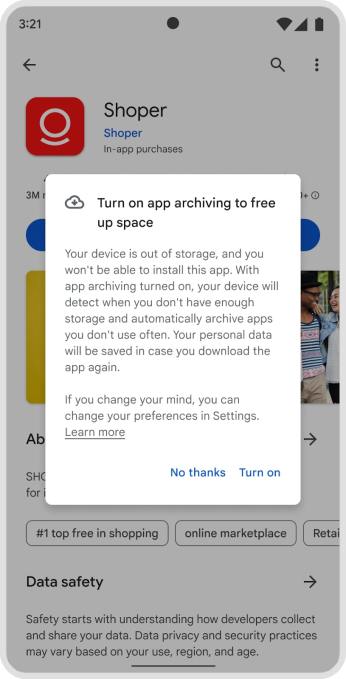
Image Credits: Google
- Starting May 31, Google will restrict personal loan apps from accessing sensitive user data like photos, videos, precise location, call logs, external storage and contacts after many app makers’ engaged in predatory behavior by harassing borrowers in India and Kenya. Google also introduced rules to ban unlicensed loan apps from the Google Play Store.
- Google brings its AirPlay-like Nearby Share feature to Windows so you can transfer files between Android and PCs.
- Google’s Android is gaining a new auto-archive feature for apps. The company says the feature will reduce unnecessary uninstalls and help users successfully install new apps. “Once a user opts in, auto-archive can help them automatically free up to nearly 60% of an app’s storage space, without removing the app presence or users’ data from the device,” said Google.
App Updates
AI
- Baidu sued various app developers and Apple over the numerous fake apps pretending to be its Ernie AI bot on the App Store. Launched last month, Ernie — a Chinese version of something like the U.S.-based ChatGPT — does not have an official app. At the time of the announcement, there were at least four fake apps found.
- Snapchat added new guardrails around its AI chatbot. The app had been criticized for responding in an unsafe and inappropriate manner shortly after its launch in February. Now, the AI bot will include an age filter and insights for parents and guardians about their children’s interactions with the chatbot in its parent controls hub, Family Center.
- The $4.99 ChatGPT app for Apple Watch, Petey AI, expanded to the iPhone with a recent update. The new app is faster than the watch-based counterpart and supports Dynamic Island and Live Activities. You can also switch out Siri with Petey using Siri Shortcuts.
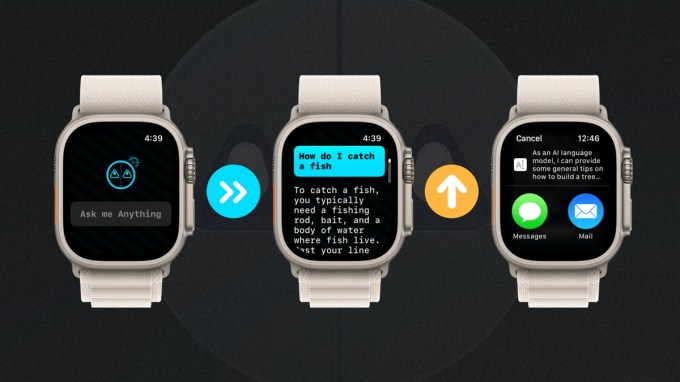
Image Credits: Petey
- Poe’s AI chatbot app, made by Quora, now lets users make their own chatbots using prompts combined with an existing bot, like ChatGPT, as the base. Initially, Poe debuted with support for a handful of general knowledge chatbots, including Sage and Dragonfly, powered by OpenAI technology, and Claude, powered by Anthropic. Last month, Poe rolled out subscriptions that allow users to pay to access the more powerful bots based on new language models, including GPT-4 from OpenAI and Claude+ from Anthropic. The new chatbot feature will only work with Claude and ChatGPT as the base bots and works on both web and mobile.
- User spending on AI apps increased by more than 4,000% year-over-year, according to Apptopia data. Downloads also increased by 1506% year-over-year, reaching nearly 20 million in March. Multiple similarly named apps like Nova AI, Genie AI and Chat with Ask AI have broken into top charts. Chat with Ask AI was on the top 10 free apps list on iOS in multiple countries.
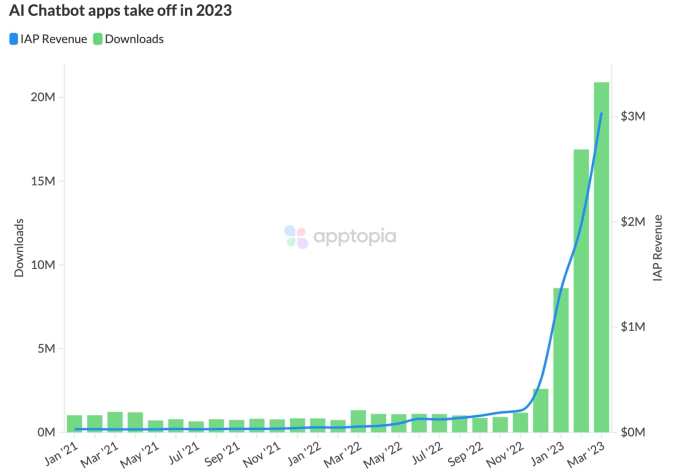
Image Credits: Apptopia
- The European Parliament is close to finalizing new AI measures that will require chatbot makers to reveal if they use copyrighted material, the FT reported citing sources.
- Pixelmator Photo rebranded as Photomator and introduced a new AI-powered subject selection feature, as well as others around selective adjustments, brush selections, gradient mask tools and more.
- Microsoft added three AI features to its SwiftKey keyboard app on iOS and Android: web search results, a tone option where AI writes text, and its AI chatbot. The features were previously available in Bing. The company also announced Bing recently hit 100 million daily users (and 100 million chats).
Social
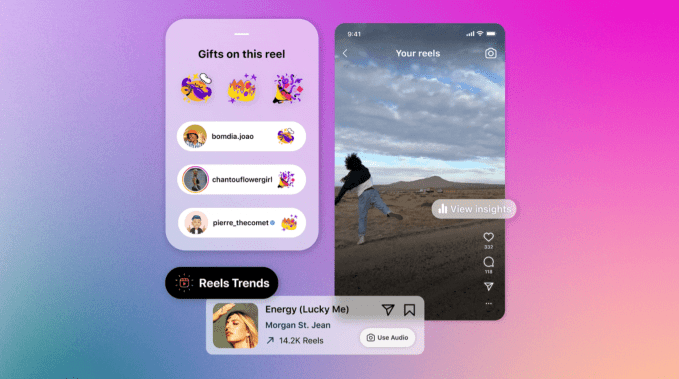
Image Credits: Instagram
 Instagram Reels gained a number of new features in a significant update.
Instagram Reels gained a number of new features in a significant update.  Among the changes are features that help creators see what’s trending in terms of both audio and hashtags, new tools that make it easier to edit reels in the app, an expansion of gifts to more markets outside the U.S., updates to Reels insights with two new metrics (total watch time and avg. watch time) and a new way to see how your reels are contributing to your growth.
Among the changes are features that help creators see what’s trending in terms of both audio and hashtags, new tools that make it easier to edit reels in the app, an expansion of gifts to more markets outside the U.S., updates to Reels insights with two new metrics (total watch time and avg. watch time) and a new way to see how your reels are contributing to your growth.
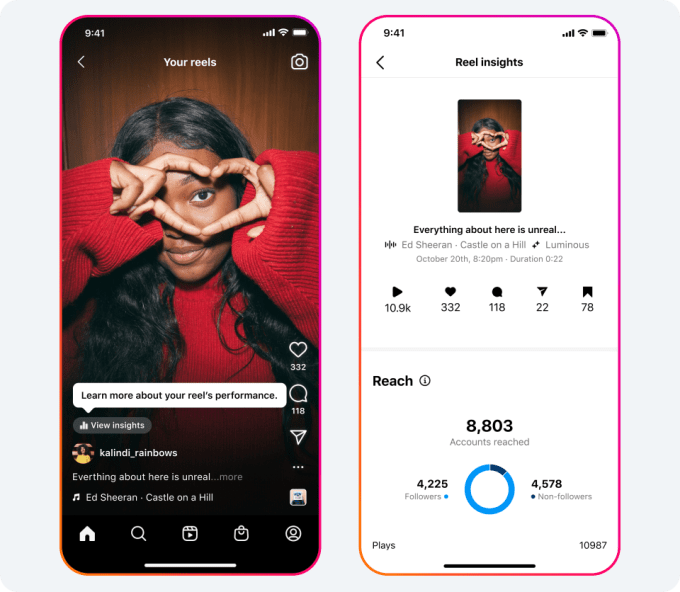
Image Credits: Instagram
- Pinterest expanded its Creator Inclusion Fund to 5 more countries: Canada, Germany, Austria, Switzerland and France. The program began in 2021 to help communities that Pinterest said have been “disproportionately underrepresented — including Black, Latiné, LGBTQIA+, Asian, Indigenous people and people with disabilities.” The fund has already supported creators in the U.S., U.K. and Brazil.
- Reddit posts on its main feeds were revamped to now have a cleaner layout with less unused space and more emphasis on community. The company said the changes will make it “easier for redditors to find the conversations they’re looking for.”
- Yik Yak users are angry about the changes being made to the anonymous chat app after its acquisition by Sidechat. Its new parent company revamped the Yik Yak app to look and function like the anonymous college chat app, when Yik Yak before was more community-based. The apps appear to now run on the same servers and users are asked for their student ID, which they worry will identify them or allow for targeted ads.
- Snapchat’s Lenses have arrived in Microsoft Teams. With the launch, Teams users gain access to a collection of 26 popular Lenses during meetings. The Lenses let you do things like turn yourself into a cartoon character or add fun backgrounds to your video calls.
- Snap also signed new music licensing deals to expand its Sounds library, which offers music that can be used in Snaps and Stories.
- Instagram added new features to its creator marketplace via new APIs to make it easier for brands to discover and work with creators on the third-party creator marketing platforms they already use. It also expanded access to brand agencies.
- Artifact, the recently launched personalized news app from Instagram’s founders, launched a social discussions feature. Previously in private testing, the feature introduces a way for users to comment and engage in conversations around news articles they’re reading on the service, which can then be up and downvoted by others, similar to Reddit. Users will also gain a visible reputation score based on their activity.
- Following last month’s NBC News investigation into Pinterest that exposed how pedophiles had been using the service to curate image boards of young girls, the company on Tuesday announced further safety measures for its platform, including a new set of parental controls and updated age verification policies, among other things. However, the company also said that it would soon re-open some of its previously locked-down features for teens to allow them to once again message and share content with others after approving contacts.
Messaging
- WhatsApp is now easier to use on multiple devices thanks to a new companion mode that lets you access your account across more than one smartphone.
- WhatsApp users in Brazil can also now pay merchants through the app, allowing consumers to have end-to-end shopping experiences from discovery to checkout.
Streaming & Entertainment
- Spotify shut down its Clubhouse-style live audio app Spotify Live, previously known as Locker Room ahead of its acquisition. Spotify bought the company in its €57 million acquisition of Betty Labs in March 2021.
- Spotify also said it’s shutting down Heardle, the Wordle-like music guessing game it acquired last year, saying its new focus will be on the discovery features it introduced recently at Stream On, including the new TikTok-like recommendation feeds.
- Spotify and activity tracking app Strava teamed up on a new in-app integration that lets users easily access their Spotify music, podcasts and audiobooks from the Strava app while tracking activities.
- Warner Bros. Discovery announced its new streaming service Max that will combine HBO Max and Discovery+ content into a single destination. The company promised a better-performing, more personalized app across platforms, which will include a range of new titles, including more spin-offs from Game of Thrones, Harry Potter, True Detective, Big Bang Theory and others, as well as more DC Comics movies. The HBO Max will automatically update to become Max on most platforms on May 23, but Discovery+ users will be allowed to remain in their same app if they choose.
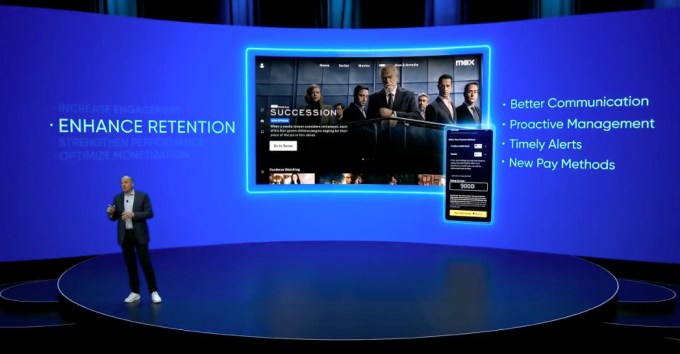
Image Credits: Warner Bros. Discovery
- Despite the threat of a TikTok ban, U.S. advertising on TikTok grew 11% in March 2023 with top spenders including Apple, Pepsi, DoorDash and Amazon.
- TikTok was spotted testing a new “Explore” tab, similar to Instagram. The tab could replace the Friends tab where TikTok today lets users keep up with their contacts and post BeReal-like photos and videos in its own TikTok Now experience.
- TikTok quietly launched “animated video stickers” for direct messages in February. The new stickers work like GIFs and are an expansion of TikTok Stickers, which first rolled out last December, letting users create and upload their own custom images to be used in direct messages.
- YouTube added a Podcasts tab to channel pages globally on its website and mobile apps that show the playlists that creators have marked as podcasts. The new tab appears between “Live” and “Playlists.”
- YouTube added new features to its paid subscription YouTube Premium bringing enhanced bitrate 1080p support on iOS and the web for “extra crisp and clear” videos, plus support for Apple’s SharePlay, and access to managing your queue on mobile.
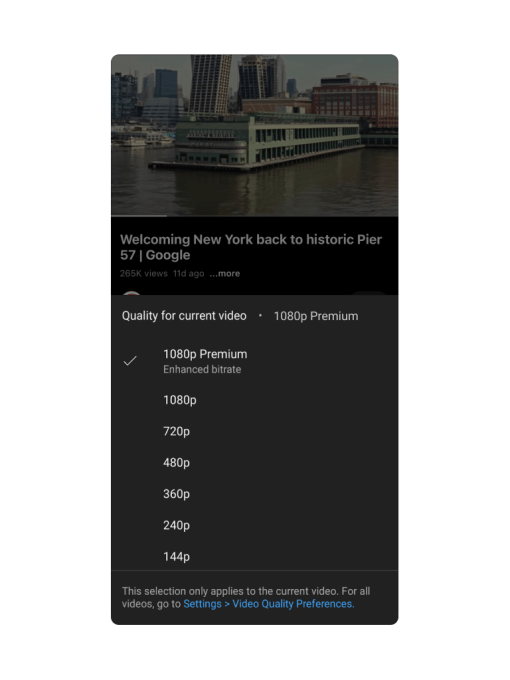
Image Credits: YouTube
- The popular music player Winamp is coming to iOS and Android after a big revamp, but it won’t be what users expect. Now owned by a company called Llama Group, the online player doesn’t look like the old Winamp at all. Instead, it will work as a streaming service where users only follow their favorite artists, who they also support in a sort of Patreon-like model of subscriptions. Currently, only some indie European and Vietnamese bands and singers were available. The player is available on the web for now, with mobile apps arriving in Q3.
- Sling TV came to the Amazon Echo Show 8 and 10, nearly two years after Amazon first announced it would.
- Spotify finally added an iPhone Lock Screen widget that offers an icon that will provide easy access to the app. The icon of the Spotify logo, when tapped, launches the iOS app before unlocking the phone.
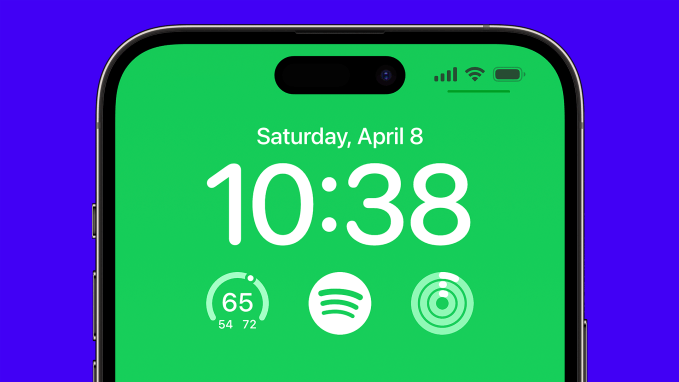
Image Credits: Spotify
Gaming
- Nintendo and app developer DeNA officially launched Nintendo Systems, the joint venture first unveiled back in November, which is meant to help reinforce Nintendo’s business and “create value-added services,” the companies said. It’s not yet known what exactly the two companies are currently working on, as no games or software have been announced.
- Nintendo is pulling Mario away from the mobile gaming market. In a Variety report, Nintendo designer Shigeru Miyamoto said that “mobile apps will not be the primary path of future Mario games.” The company had earlier launched two moderately successful iOS titles and others, Dr. Mario World, that was removed two years after its release. Super Mario Run grossed $60 million in its first year and 2019’s Mario Kart Tour has generated $300 million.
- Pokémon GO is sidestepping the App Store and Google’s Play Store by selling its PokéCoins via its new Pokémon GO Web Store. The company emailed it users to notify them of the launch where it’s selling the bundles. The U.S., however, was not among the countries supported at launch.
- Messenger introduced 14 free-to-play games you can play during video calls in the messaging app on the web, iOS or Android. Among the titles were Words With Friends, Card Wars, Exploding Kittens, Mini Gold FRVR and more.
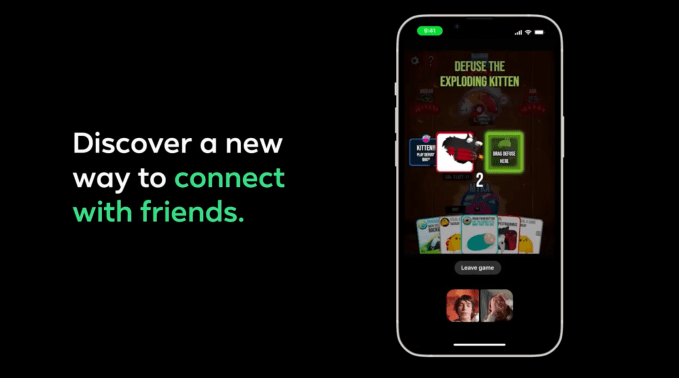
Image Credits: Facebook Gaming
Fintech
- Social finance app Hyve opened to the public after earlier raising $2.25 million in a pre-seed round in January 2022 from an investor group that included The Flying Whale VC, MoreVC and the founders of Guardio. The app is targeting Gen Z and young millennials with tools to pay down debt, save and invest with the help of friends and family.
- Visa announced a new interoperable peer-to-peer (P2P) payment offering, Visa+, that allows people to transfer money to friends even if they use a different payment service. The service will later this year power a new integration that lets Venmo and PayPal users transfer money between their users — both are owned by PayPal, however. Other companies that have committed to Visa+ include Western Union, TabaPay, i2C and DailyPay.
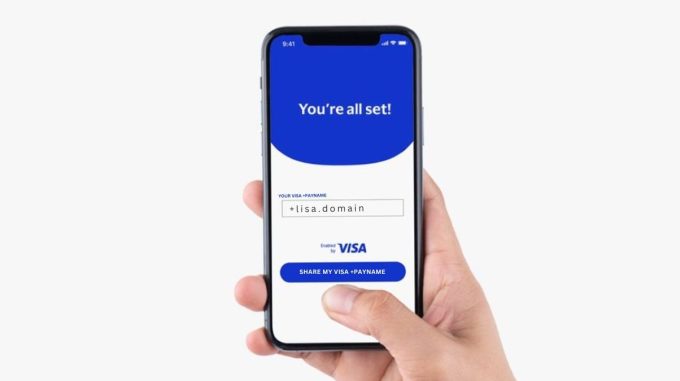
Image Credits: Visa
Security
- Hackers used spyware created by an under-the-radar Israeli spyware maker QuaDream to create malicious calendar invites in order to hack the iPhones of journalists, political opposition figures and one NGO worker.
- WhatsApp introduced new device verification and account protection features, including new defenses against SIM jacking and other social engineering attacks. The downside of the changes is that moving WhatsApp to a new phone may become more difficult with added steps.
- Several security experts found malware on Chinese shopping app Pinduoduo that exploited vulnerabilities in the Android OS. The exploits were said to be used to spy on both users and competitors in an effort to boost sales and were found in off-Play Store versions of the app, as Google Play Protect would have likely identified the malware. The team working on the app was then moved to Temu, now a top U.S. shopping app.
Etc.
- You can now order a Domino’s pizza from your car thanks to the app’s new CarPlay support.
- Amazon removed systemwide hands-free Alexa access on Alexa Built-In smartphones, including a handful of models from OnePlus, as well as models from brands like Motorola, Sony, LG and Moto.
- Truecaller rolled out an update that will finally provide live caller ID support on iOS, available to people using its paid tiers. However, the system comes with a catch — it only works via a Siri interaction, due to Apple’s limitations on third-party caller ID apps.
- Opera, the makers of an ad-blocking web browser, rolled out an updated version of its iOS app that now includes its free VPN. Previously available on Mac, Windows, Linux and Android, the iOS release now makes Opera the first browser to offer a free VPN service across all major computing platforms, the company said.
- ComiXology vets return to startups with DSTLRY, a next-gen comics publisher that will distribute both in print and digitally via an app that will launch further down the road.
- Google Maps introduced new features to make it easier for users to navigate national parks, including trail maps that show the entire route, not just a pin.
Government & Policy
- Apple won an appeal against a U.K. antitrust regulator that wanted to open an investigation of the iPhone makers’ mobile browser and cloud gaming service. The Competition Appeals Tribunal (CAT) ruled the regulator was too late in deciding to open the probe. “We are pleased with the Competition Appeal Tribunal’s decision and will continue working to deliver support for developers and a safe and secure experience for users,” said Apple.
- TikTok was fined £12.7 million (~$15.7 million) for breaching U.K. data protection law, including rules intended to protect children. Per the ICO, TikTok had an estimated 1.4 million underage U.K. users during a two-year period (May 2018 and July 2020), contrary to the terms of service stating users must be 13 or older.
- Australia is the latest country to ban TikTok on government devices. Other countries with bans include New Zealand, the U.S., the U.K., Canada, Belgium and others in the EU.
- Germany’s antitrust authority confirmed Apple meets its test for special abuse controls — saying the company has “paramount significance for competition across markets”. The designation stands for five years and allows Apple to face an inquiry into its possible antitrust abuses. Apple plans to appeal.
- Vietnam’s Ministry of Information and Communications is opening a probe into TikTok over harmful content and false information. The ministry said TikTok’s Vietnam arm had taken down 2.43 million videos uploaded by Vietnamese users in Q1 2023 over violations of community guidelines related to “nudity, sexual acts involving minors or inciting violence” and “for frightening content, harassment, bullying, suicides, and others.” Now the office believes that removal may not be enough and should be subject to tougher rules.
- South Korea Fair Trade Commission (KFTC) fined Google $32 million for blocking developers from releasing games on a Korean Play Store competitor called One Store. Google allegedly required Korean video game makers to exclusively release their new games in the Play Store from June 2016 to April 2018, in violation of fair competition laws.
- Arkansas Governor Sarah Huckabee Sanders signed a bill that requires that social media companies verify new users’ ages and get a parent’s consent for users under 18. The state is now the second to create its own laws to regulate social media, following Utah, due to the lack of federal oversight.
Funding and M&A
- Right-wing social media platform Parler was acquired by digital media conglomerate Starboard, which recently changed its name from Olympic Media. The company will temporarily shut down the app ahead of a revamp and relaunch of an updated version. Financial terms weren’t disclosed.
- U.S.-based savings and investing startup Acorns acquired London-based GoHenry for an undisclosed sum. Acorns was most recently valued at $2 billion; GoHenry was believed to be valued at between $250 million and $500 million in October 2022.
- Savvy Games Group, a games and esports company that is part of the Saudi government’s Public Investment Fund, is acquiring mobile games studio Scopely for $4.9 billion. Scopley’s top games include Yahtzee With Buddies, Star Trek Fleet Command, Marvel Strike Force, Stumble Guys and Scrabble Go.
- Emirates Telecommunications acquired a 50.03% stake in the super app Careem from Uber’s Middle East unit for $400 million. Uber will keep Careem’s ride-hailing business as part of this deal.
- SMB growth app Zeely’s raised a $1 million seed round from Ukrainian VC Vesna.Capital, Angel One Fund (a Ukrainian fund), Imaguru Ventures, and angels Murat Abdrakhmanov (an investor in Udemy), Adrian J. Slywotzky (a partner at Oliver Wyman) and ZAS Ventures. Zeely’s app can generate a web store quickly on a mobile, as well as allow a business to promote itself across social media platforms like TikTok quickly and easily.
- General Atlantic invested another $100 million in PhonePe, three months after leading a $350 million investment in the Indian fintech startup. At a $12 billion valuation, PhonePe is India’s most valuable fintech and competes with Google Pay and Paytm.
This Week in Apps: Newsrooms leave Twitter, Reels expands, Android 14 arrives by Sarah Perez originally published on TechCrunch
Source : This Week in Apps: Newsrooms leave Twitter, Reels expands, Android 14 arrives










